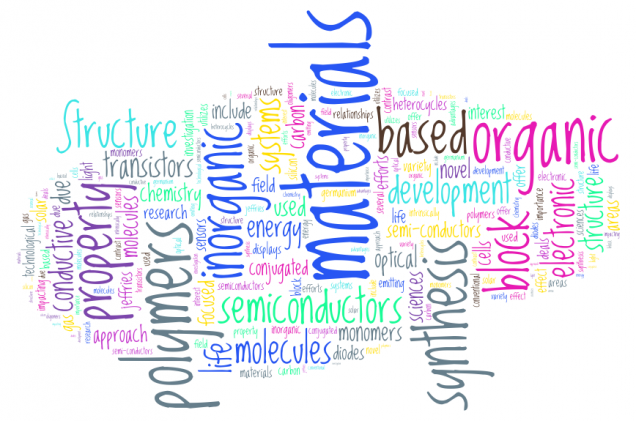Welcome to the Jeffries-EL Research Group
 Organic semiconductors are a unique class of materials that combine the processability of organic materials with the optical and electronic properties of semiconductors. These complex materials impact several areas of technological importance including energy (solar cells), displays (light emitting diodes), electronics (field effect transistors), and health (sensors). These carbon-based small molecules, oligomers or polymers were initially envisioned as replacements for silicon and rare-earth metal(s) based semiconductors widely used today. However, organic materials can be used to produce devices with properties that cannot be attained with inorganic materials, such as color tuning and fabrication on irregular surfaces. Although there are many known issues with organic semiconductors such as the scalability of chemical synthesis and elimination of defects within the materials, many performance improvements can be made to advance these materials towards large-scale manufacturing of ”plastic” electronics. Drawing upon my formal training in the area of organic chemistry, I am able to employ an atomic level approach toward developing new organic semiconductors.
Organic semiconductors are a unique class of materials that combine the processability of organic materials with the optical and electronic properties of semiconductors. These complex materials impact several areas of technological importance including energy (solar cells), displays (light emitting diodes), electronics (field effect transistors), and health (sensors). These carbon-based small molecules, oligomers or polymers were initially envisioned as replacements for silicon and rare-earth metal(s) based semiconductors widely used today. However, organic materials can be used to produce devices with properties that cannot be attained with inorganic materials, such as color tuning and fabrication on irregular surfaces. Although there are many known issues with organic semiconductors such as the scalability of chemical synthesis and elimination of defects within the materials, many performance improvements can be made to advance these materials towards large-scale manufacturing of ”plastic” electronics. Drawing upon my formal training in the area of organic chemistry, I am able to employ an atomic level approach toward developing new organic semiconductors.
Videos from the Jeffries-EL group
Take a tour of the Jeffries-EL lab!
21st Century Scientists: Malika Jeffries-EL
In this 21st Century Chemist profile, Iowa State University organic chemist Malika Jeffries-EL explains her work to make less costly, more energy-efficient semiconductors and LEDs from organic, carbon-based materials such as plastics, “doping” the organic materials so that they are more conductive. To learn more, click here:”From Metal to Plastic: Iowa State Chemist Works on Organic Semiconductors”
Provided by the National Science Foundation & NBC Learn
Runtime: 4:57
Fabricating Fabric: Nylon–This video explains the history of nylon, the first synthetic fiber developed for mass production, and explains polymers, polymerization, amide links and polyamides. It includes a demonstration of the Nylon Rope Trick: making nylon fiber in a lab beaker.
Credit: NBC Learn and the National Science Foundation (NSF)
Nova: Beyond the Elements We owe a lot to science! In support of our Nova’s fund raising campaign— professor Jeffries-EL shares with you why she has reason to say #ThankYouScience.
Credit: NOVA/WGBH
Super Science Tuesday Boston University– Throughout the 2016 presidential campaign, The Science Coalition is asking people to answer the question: Why should science matter to the presidential candidates? For more information, visit www.ScienceMatters2.me.
Credit: The Science Coalition